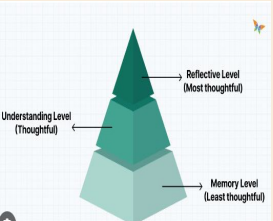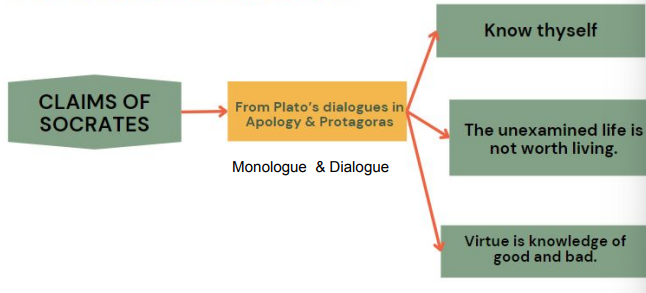Philo: The Value of Philosophical Reflection
1/31
There's no tags or description
Looks like no tags are added yet.
Name | Mastery | Learn | Test | Matching | Spaced | Call with Kai |
|---|
No analytics yet
Send a link to your students to track their progress
32 Terms
The Reflective Life

Socratic Legacy

Plato’s Apology
Genre: Philosophical defense speech (not a dialogue in the usual sense)
Setting: Socrates' trial in 399 BCE (Before Common Era)
Main Characters: Socrates (speaking to the Athenian jury)
_______ Socrates’ defense against charges of corrupting the youth and impiety (lack of respect).
He defends his method of elenchus (cross-examination) and claims wisdom lies in knowing one’s own ignorance.
He is sentenced to death, but remains defiant, confident that a just life is more important than survival.
Socrates
“The unexamined life is not worth living.”
Plato & Protagoras
Genre: Philosophical dialogue
Setting: A conversation at the house of Callias in Athens
Main Characters: Socrates, Protagoras (a famous sophist), and others
"Protagoras," Socrates debates the famous sophist Protagoras about whether virtue can be taught.
Socrates questions the unity of the virtues
Protagoras argues that virtue is teachable
Agora in ancient Athens
Socrates philosophize in the public place ____, compelled people to:
think
defend their views
account for what they know and do not know
He asked people series of questions, engaged them to answer
Socratic Method/Philosophical Reflection
Effective method of education
We are compelled to reflect on what we believe or claim to know
What we believe to be true becomes the basis of our action
Lao Tzu
Watch your THOUGHTS
They become WORDS
Watch your WORDS
They become ACTIONS
Watch your ACTIONS
They become HABITS
Watch your HABITS
They become CHARACTER
Watch your CHARACTER
It becomes your DESTINY
A Philosophical reflection is indispensable because…
we do not realize what we truly believe until we are challenged to defend them.
most common self-image identifications
worldly possession, social/cultural standing and the level of acceptance.
academic education, physical characteristics, social and intimate relationships, family history, belief systems and other political, gender,& race.
Sometimes we define ourselves by
how we feel
in response to the outcomes that we had at some points in our past.
Aristotle
defined virtue as a mean between excess and deficiency, a balance of character traits and behaviors achieved through habit and rational choice. He believed virtues are developed through practice, leading to moral excellence and a fulfilling life.
Philosopo as a Social Critic
one with skill in evading/avoiding arguments.
Fallacy
an argument that may sound convincing or true but is actually flawed.
are lapses of logic that lead us to an unsupported conclusion.
Sophists (Relativism)
Group of people in Greece who are teaching - ARETE - excellence (poetry, science, mathematics...)
uses argument to win and not to find the truth - Plato & Aristotle
Protagoras, (Sophists)
Uses argument to appear the weak appear stronger
Man is the measure of all things
Every individual has a measure of his own truth
law of society is relative
Gorgias’ view
emphasized that society’s laws (nomos) often oppose natural order (physis).
nature (physis): the strong have power over the weak. In society (nomos): laws are created to protect the weak and restrain the strong.
Callicles
the strong dominate the weak. This is not “unjust” — it is simply the way reality works.
in natural order, might makes right
Social Law (Nomos)
Callicles argued that laws (justice, equality, fairness) are inventions of the weak majority to protect themselves from the strong minority
these laws go against nature because they restrict the natural superiority of the strong.
Lycophron
in natural order, all humans are equal
Slavery is unjust in the law of nature
Societies create hierarchy not found in nature
Protagoras
“One every issue there are two arguments opposed to one another“
on any single question there are at least two side of argument
Sophism
a term used to describe a particular style of argumentation and reasoning that is often associated with deception and trickery
type of rhetoric that aims to persuade rather than inform, and that it relies on clever wordplay and logical fallacies to make its point.
Fallacy
mistake in reasoning that makes an argument invalid or weak
may sound persuasive, but it does not logically prove the point.
Philosophers, logicians, and debaters study _____ to avoid being misled.
Ad hominem
instead of attacking the argument, someone attacks the person making the argument.
fallacious argumentative strategy whereby genuine discussion of the topic at hand is avoided by attacking the character, motive, or other attribute of the person making the argument, or persons associated with the argument, rather than attacking the substance of the argument itself
“to the person“
Appeal to ignorance
aka Argumentum ad Ignorantiam.
when someone claims that something is true because it hasn’t been proven false, or false because it hasn’t been proven true.
“We don’t know, so my claim must be correct.”
Hasty Generalization
A fallacy in which conclusion is not logically supported by sufficient evidence.
evidence is insufficient or biased
Equivocation fallacy
defined as a logical fallacy in which a term or phrase is used multiple times to convey different meanings, making the argument it is used illogically.
An argument in an ambiguous way, with one meaning in the other side of the argument and another meaning in the other portion of the argument, making the argument misleading.
“The sign said ‘fine for parking here,’ so I thought it was fine to park.”
Appeal to Pity
aka Ad Misericordiam fallacy
someone tries to win support an argument or idea by exploiting the opponent's feelings, pity or guilt.
Bandwagon
when a proposition is claimed to be true or good solely because many people believe it to be so.
Post Hoc
aka Ergo Propter Hoc (Superstitions)
occur when it is assumed that, because one thing happened after another, it must have occurred as a result of it.
Appeal to Force
aka argumentum ad baculum
When force, coercion, or even a threat of force is used in place of a reason in an attempt to justify a conclusion.
Pamimilosopo
The true philosopher, observes, thinks and sees clearly with the mind, and speaks the truth.
We need the pilosopo to engage others to see the truth and live by it.